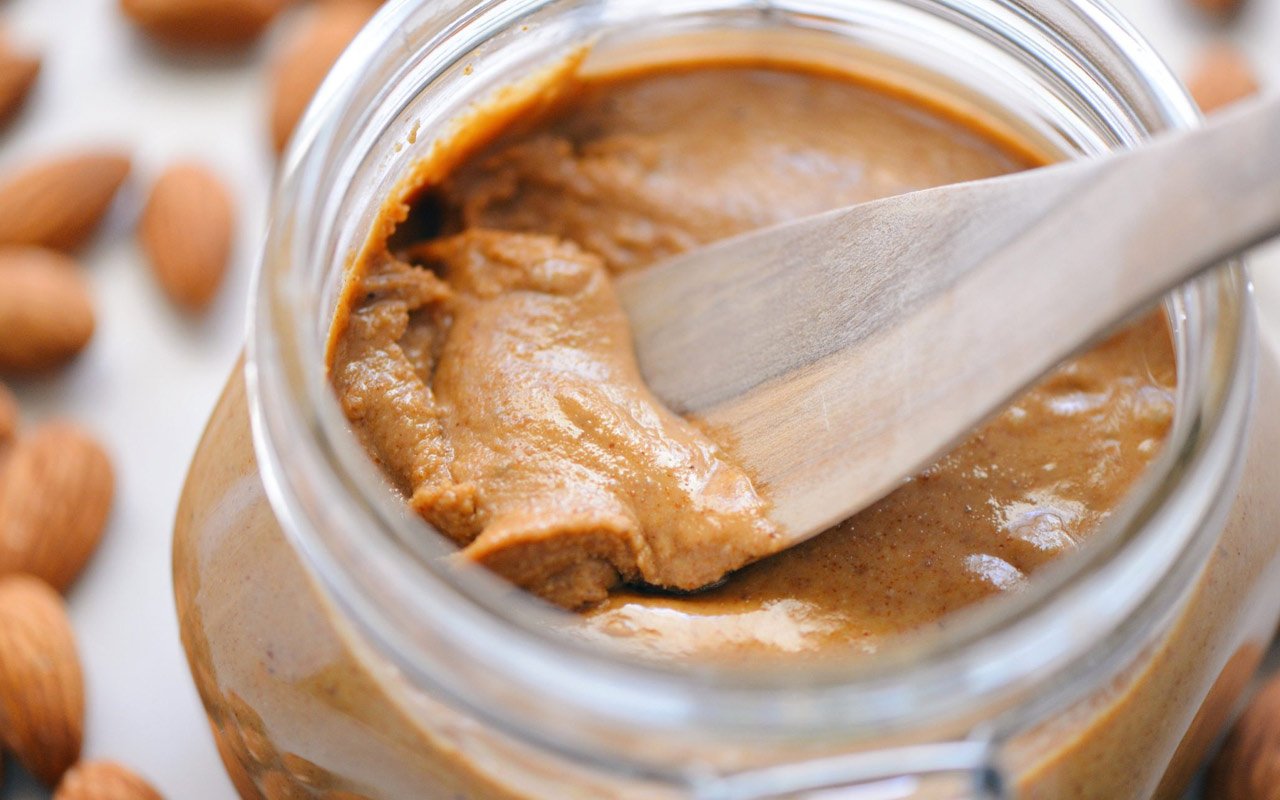Can dogs eat nut butter? If yes, which nut butters are safe for dogs? Are peanut butter, cashew butter, or almond butter safe for dogs? Read on to find out
You will often hear dog owners say that their dogs love peanut butter. Peanut butter is a favorite dog treat. Peanut butter treats for dogs have been available in grocery stores’ pet aisles since the beginning.
Manufacturers are now using other types of nuts butter for dogs. The number of dog treats and nut butters has increased.
Nut butters can be high in fat so you should limit the amount of these treats that your dog is allowed to eat. Overeating can lead to obesity. It can even lead to pancreatitis.
Be careful if you’re one of those dog owners who enjoy sharing their food with their dogs. While some nut butters can be safe for dogs, others could prove toxic. Dogs rely on humans for their safety, health, and well-being.
You should only give your dog food that is safe. If your dog becomes uneasy after eating nut butter, you should immediately take them to the veterinarian.
These days, the variety of nut butter available in the food industry has changed. They are now more diverse than almond butter or cashew butter.
All of these nut butters are safe for dogs. What should you do to ensure your dog is safe from nut butters?
Peanut allergies in humans have been on the rise. You need to be cautious about where peanutty treats might be introduced to your doggies.
The food industry introduced a variety of nut butters, either because of peanut allergies or to satisfy humanity’s desire for variety. You can find a variety of nut butter at your local supermarket, including cashew, almond, and sunflower.
Nut butter can be dangerous for dogs. You may think that any nut butter found in the pet aisle must be safe for dogs to consume. Dogs love tasty treats. Peanut butter and other types of peanut butter are a favorite treat.
Have you ever wondered how much peanut butter is recommended? Do dogs even need almond butter? Worse, nut butter could cause illness in dogs.
Table of Contents
Can Dogs Eat Nut Butters?

Did you know that dogs have different digestive systems than humans? It’s true, believe it! This also means our dogs can’t eat the same foods as us.
It will reduce the number of visits to the vet by being aware of what your dog is allowed and prohibited from eating.
Most nut butters can be eaten by dogs. However, as we all know, nuts are high in calories and should be given to your dog only occasionally and in very small amounts at a time.
All nut butters, including peanut butter and cashew butter, are safe for dogs. You can give them by filing a kong or baking them in treats. It is an effective way to hide your dog’s medication in nut butter.
You can also distract your dog by giving them treats like nut butter while you trim their hair or cut their nails. You will have your dog busy eating the treats, and your tasks will be easy.
Almond Butter
Almond butter is a beloved human food. Can dogs eat almond butter? We have the answer to that question and more if you have ever been wondering.
Almond butter can be enjoyed by your dog. Almond butter is not for everyone so be careful. Almond butter is good for your dog’s health. Nut butters can contain high amounts of sugar, salt, and unhealthy oils such as vegetable oil.
In recent years, almond butter has been more in demand. It’s safe for your dog to eat almond butter. Almond butter must be given to your dog in moderation, just like other nut butter. Almond butter is not toxic but some dogs have difficulty digesting it.
If you decide to add this butter to your dog’s diet, be aware of upset stomachs. However, indigestion can be caused by almond butter. Almond butter has a high-fat content that makes digestion more difficult.
Almond butter is high in fat, which can cause upset stomach problems for your dog. These additives will only make your dog’s diet more filling. The ingredients list should only include almonds, as this is what you will see on the label.
Many brands are available without added sugar or salt. Organic almond butter is a great option to avoid pesticides in your dog’s food.
It is also important to ensure that the almond butter you buy does not contain xylitol. This sugar alcohol often replaces sugar in baked goods and nut butters.
Xylitol, which is a sugar alcohol that can be added to nut butters in order to make them sweeter, is being used without real sugar.
This sugar substitute is very toxic for dogs and other animals. You should not feed it to your dog.
Also, you need to limit the amount of almond butter your dog eats. Almond butter is rich in nutrients but high in calories and fat. This can cause weight gain for your dog.
Almond butter should only be given to dogs occasionally. This is a minimum of once every two weeks. The amount you give your dog will depend on its size. Almond butter can be baked into delicious homemade treats for dogs so that they can enjoy it in smaller amounts.
Peanut Butter
The most common question we get is “Can dogs eat peanut butter?”
Everyone knows that peanuts are among the nuts that dogs can eat. And it’s not surprising that peanut butter is also a favorite food for dogs. However, we need to limit the dose of peanut butter for dogs depending on the size and weight of the dog.
Peanut butter is a favorite treat for dogs, whether it’s used in a cookie recipe or poured into a Kong. Peanut allergies in dogs are very rare.
Your dog can still enjoy peanut butter if it isn’t an issue with others. Peanut allergies are on the rise and you might be reluctant to allow peanut butter treats into the world. That makes sense.
Peanut butter is safe for dogs. Peanut butter is not good for dogs, just like peanut butter in general. Moderation is the key! For smaller dogs, a teaspoon should suffice and a tablespoon for larger dogs. Peanut butter cookies and PB treats are favorite treats for dogs.
Peanut butter is safe for dogs, but it’s important to read the labels before buying dog food. Some dog food brands contain a natural sweetener called “xylitol”, which can be very poisonous for dogs.
If you don’t find a brand with clean ingredients in your area, you can make peanut butter yourself.
Pet parents are often asked if their dogs can eat peanut butter cookies and crunchy peanut butter. The answer is yes. Peanut butter mixed with kibble can be a delicious combination for dogs.
Cashew Butter
This lovely crescent moon-shaped nut is acceptable for dogs, but only in small amounts. Fido can have a little fun with you, but not too much.
Dogs can also eat cashews nuts but in very small quantities. Cashew butter must only be made with roasted cashews.
A dog that ate raw cashew nuts can have a toxic reaction. After roasting, raw nuts are freed from a toxin. Another thing to note is that cashews butter must also be made from unsalted cashews to be safe for dogs
Cashew poisoning is very rare. However, it’s worth being aware of the symptoms if your dog consumes raw cashew nuts.
Cashews butter is all high in fat. This nut butter is safe to be eaten by dogs, but high-fat content can cause upset stomachs in dogs. Cashews butter is okay to be given as a treat, but not too much.
You can also give nuts as snacks, but make sure there aren’t any shells and that the nuts are crushed. The shells can be harmful if swallowed whole. This could lead to intestinal obstructions that require medical treatment.
Hazelnut Butter
Dogs are safe from the toxic effects of hazelnuts. Smaller dogs may find whole hazelnuts choking. However, hazelnut butter is safe for all dogs.
Nut Butters Your Dog Should Not Eat
There is nut butter that is safe for dogs, but there are some that you should not share with your dog.
Your pup should be free from walnuts, pistachios, and macadamia nuts in any form. Macadamia nuts contain a toxic chemical that can cause brain damage in dogs. You should keep your dog away from any chocolate-coated nuts.
You should avoid nut butter containing additives like xylitol. This ingredient can be very dangerous for dogs. It’s usually found in sugar-free and reduced-sugar products, so make sure you read the label before giving it to your dog.
These are some of the nuts butter you should avoid giving your dog.
Pistachio Butter
Pistachios should be kept away from dogs. Pistachios are not recommended for dogs, despite being very popular with humans in recent years.
Aspergillus mold can live in pistachios, which can cause liver damage to dogs. It is better to keep your dog from eating this green food.
Pecan butter
You should keep your dog away from pecans and other nuts. These nuts can also contain harmful substances for dogs’ livers.
Walnut Butter
Walnuts of all varieties, whether they are Japanese walnut, English walnut, or Black walnut, should be avoided by your dog. They can cause stomach irritation and can be toxic for your pet.
Moldy walnuts can be particularly dangerous and cause seizures, among other neurological problems. Keep walnuts out of reach of your dog.
Macadamia Butter
Under any circumstance, do not give your dog macadamia nuts and nut butter. They can be fatal to dogs. These can cause your dog to have weak legs or shivering, vomiting, diarrhea, and even fever.
Even if your dog does not show any symptoms, you should contact your veterinarian immediately if you suspect that he has had macadamia nuts.
Summary
You should read every label before you give any nut butter to your dog. Dogs should not eat Xylitol. This artificial sweetener is added frequently to butter that is commercially available. Butters can contain high levels of oil and salt. You should ensure that there is no chocolate in your butter.
By nature, nuts are high in oil and high-calorie. Even safe butters such as peanut butter, cashew butter, and hazelnut butter can be high in calories. They should not be given to dogs more than once a week and only in small quantities.
